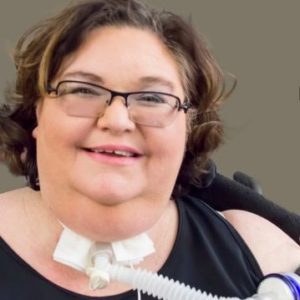
An Interview with Catherine Strode
Colorado’s “End of Life Options Act,” also known as Proposition 106, is on the November ballot. A “Yes” vote will support making assisted death legal among patients with a terminal illness. Carrie Ann Lucas, an attorney and self-advocate, has over 20 years of expertise working for disability rights organizations. She is also on the board of Not Dead Yet, a national grassroots disability organization. Ms. Lucas is strongly opposed to Colorado’s Proposition 106. In an interview with Catherine Strode, she calls Proposition 106 “dangerous policy” and discusses the lack of safeguards for Colorado’s most vulnerable populations.
Why are you opposing Proposition 106?
“I oppose it because I think it’s dangerous policy. We should be creating laws that protect the most vulnerable people in society, not laws that help only a small number of people and put a larger number of people at risk. The so-called safeguards are so weak, they place a great number of elderly and disabled Coloradans at risk. Let’s start with the alleged ‘terminal illness.’ What it requires is that someone has an incurable condition that would result in death in six months without treatment. That’s everyone in Colorado who has Type I diabetes, for example; people who have significant epilepsy who, if they went off their seizure meds and took no medication, would die of a seizure; people like myself, with muscular diseases, who rely on respiratory support. It is not limited to dying people. I think that’s the way this is being sold to the public in Colorado. Instead of being sold for terminally ill people, it is for people who would die in six months if they had no treatment. That is a large number of people. It is extraordinarily broad.”
In what other way does it put individuals at risk?
“There’s no witness at the time of death. What can happen under this law is: coercion. The coercion will go like this: ‘You’re getting old. I’m tired. I’m not going to be able to keep taking care of you. I’m going to have to put you in a nursing home. But you could do assisted suicide instead. Don’t you think that would be a good option, Mom?’ This is probably from a person who controls their health care, who’s doing their shopping, handling their finances. Not all people in Colorado have loving families around them. They say, ‘Don’t you want to make this choice? You know if you don’t make this choice we’re going to have to put you in a nursing home.’ Nobody wants to die in a nursing home. The person goes to the doctor and they agree to get the prescription. Now that family member can take that prescription to the pharmacy and they can fill it. Then, they can force feed it to the person without anybody knowing. There’s no witness at the time of administration. There’s no way to ensure that this is not being coerced.”
What about the safeguard of the patient having to be mentally competent?
“This should require a psychological evaluation. It does not. It’s optional. I think it should be mandatory before anyone can access this medication. If a doctor thinks you need it he can say, ‘Before I sign this, I want you to have a psychological evaluation.’ You can doctor shop to another doctor to get around that requirement. I think it should have to be someone’s primary care physician with whom someone has been in a doctor/ patient relationship for some time. It just says an ‘attending physician.’ Anyone who has been in a hospital knows that whatever doctor comes into your room for five minutes at the beginning of the shift, that’s your ‘attending physician.’ It doesn’t mean they know anything about you. Under this law, you can go to somebody new and say, ‘You’re my new attending physician now,’ and the doctor can sign off on this request.”
How do you think this law can be abused?
“I am a quadriplegic myself. I am also the parent of four children with disabilities. Those of us who are disabled, and have family members who are disabled, see how our lives are devalued by the medical system. Under this law, some people get suicide prevention (as in people who don’t have a disability.) Under this law another class of people, all of whom have one type of disability or more, get suicide assistance. That’s a problem. I’m a person that qualifies under this bill today. I could experience depression. If I had that happen, I would hope my doctor would say, ‘No, I think something else is wrong and I think you should get mental health treatment. This isn’t how you normally act.’ But under this proposed law, people find another doctor. And because of the biases of the medical profession about lives like mine, where we need assistance with the activities of daily living, they’re going to say, ‘Of course you want to die. Look at you. You’re disabled.’
 Catherine Strode is Advocacy Denver’s Communications and Policy Specialist. She holds a Masters degree in Public Administration with an emphasis in Health Care Policy. Catherine publishes Policy Perspective, featuring interviews with state policy makers on issues that affect the work and mission of Advocacy Denver.
Catherine Strode is Advocacy Denver’s Communications and Policy Specialist. She holds a Masters degree in Public Administration with an emphasis in Health Care Policy. Catherine publishes Policy Perspective, featuring interviews with state policy makers on issues that affect the work and mission of Advocacy Denver.
